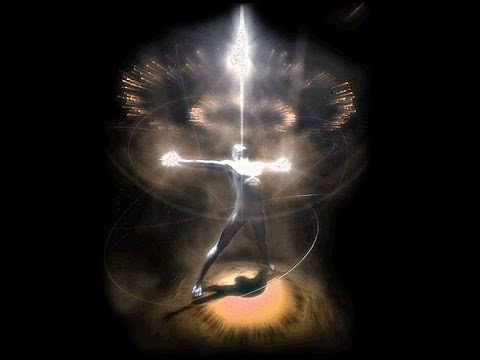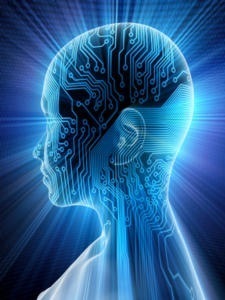I received one of those robo-calls where initially you think there’s a human on the other end, but after the first programmed exchange, you realize it’s a computer. In the near future, you won’t be able to tell at all, because AI will be programmed to allow interruptions and associations, just like programmed people.
So what is the essential difference between highly advanced computers and soon-to-be slower-thinking humans? Contrary to what AI idolizers believe, computers will never be self-aware, sentient. Awareness and self-knowing will always distinguish the human being from our self-replicating machines.
The term self-replicating has a triple meaning here. It refers to how the self is continuously replicating itself within us as the chief program of thought; how humans are programming computers with selves and people are equating sentience with a computer being able to say it has a self and a human not being able to prove otherwise; and how this ‘ghost in the machine’ will replicate itself in other machines.
All this brings into bold relief the metaphor of darkness. Summoning public attention, a columnist for the Washington Post writes:
 “In the darkness, it’s easier to avoid summons to public attention… When it’s dark out, the world itself seems to hesitate. There’s sanctuary in that pause.”
“In the darkness, it’s easier to avoid summons to public attention… When it’s dark out, the world itself seems to hesitate. There’s sanctuary in that pause.”
That’s from a writer with a Masters in Christian theology, and a ‘PhD candidate in religion—incomplete.’ She misses the mark by a universe when she says, “I can’t imagine a more precious treasure, now, than a long and unbroken thought.” That too is darkness.
The writer does go beyond the metaphor of metaphysical darkness when she writes: “There is a beauty to autumnal darkness — the softness of the night sounds and the cool air, the way shadow pools in even sparse thickets of urban trees, lending them the gravitas of deep woods.”
So what is darkness? The metaphorical, metaphysical darkness of which I speak is both a condition of the culture and human consciousness, as well as a euphemism for evil.
There has never been, to my knowledge, an adequate philosophy of evil, whether Western or Eastern. Nearly all philosophies of evil are theological systems, which, though they may offer some insight, are flawed from the get-go by the frameworks and contexts of belief systems.
So, without psychologizing evil, is there an adequate philosophical explanation for it? I feel so, if we begin with the premise that evil does not exist in nature but is a byproduct of human consciousness. And end with the realization that the intentional darkness in human consciousness (aka evil) is total deadness, as it itself is nothing and knows it is nothing.
Not just philosophers, but all of us are being confronted with the question of consciousness in the age of AI and VR (Virtual Reality). Speaking of the latter, have you seen the Bose commercial with a woman wearing high-end headphones while riding on the bus?
Various comical scenes unfold as the bus goes by: a huge cartoon balloon between two buildings; a young man chasing a chicken; a motorcyclist becoming airborne and his cycle crashing into and scattering a truckload of bananas. The commercial ends with: “Don’t Miss a Thing.”
In other words, miss everything, by seeing the entire world as one’s personal virtual playground.
Gathering these threads together, the one thread that runs through AI, VR, and the WAPO columnist is a failure to perceive and address the accumulating darkness in human consciousness.
Adapting to it and living within it, as AI and VR aficionados consciously or subconsciously propose, or even more obstinately, embracing it as a “sanctuary” as the Christian columnist proposes, doesn’t work and only makes matters worse.
As the saying goes, be careful what you want, you may get it. AI and VI will give us what theologians now say they want most—“the precious treasure of one long and unbroken thought.”
The complete, spontaneous quietness of thought in effortless attention to its movement is the antidote to darkness, not some imaginary continuity of unbroken thought.
By its very nature, thought breaks things up. That was ok when humans still had some relationship to nature, and only made furniture out of trees, but it is not ok when the rainforest is being cut down.
We can escape into a virtual world where totally immersive thought-realities allow us to imagine we can do and be anything our personal whims desire. But we will no longer be human, much less grow into human beings.
Martin LeFevre

